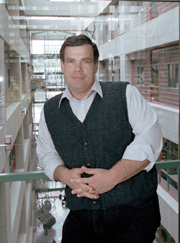|

Concordia
graduate students are gaining valuable experience in dynamic corporate
environments, said Education Professor David Wells.
Photo by Andrew
Dobrowolskyj
|
by Amy Paradis
“People tend to think of education in terms of an elementary school
or high school classroom,” said Education Professor David Wells,
“but what do you think goes on in corporate training?”
Wells is the director of the Educational Technology graduate program.
In an interview, he explained that while the use of technology is certainly
beneficial in school settings, corporations have increasingly been demanding
— and willing to pay for — technological solutions to training
employees. And thanks to high-quality internships, Concordia graduate
students are gaining valuable experience in this dynamic environment.
Educational Technology, said Wells, is an applied social science in which
technology supports learning and performance. In recent years, for example,
the popularity and the availability of the computer has introduced CD-ROM-
and Web-based training to corporate settings.
The computer, above all other tools, is changing our expectations regarding
business practices.
“When I first came to Concordia, I remember that when people tried
to reach you by phone, they’d expect you to call them back within
four to five days,” Wells said. “Now, with e-mail, if someone
sends you a message at nine in the morning, they call you at noon asking,
‘Have you got my message?’”
A recent performance technology innovation is electronic performance support,
which provides employees with a large quantity of easy-to-access knowledge
at their fingertips. This is often used in call centres, where the workers
may not personally know the answers to the customers’ inquiries,
but can search for them on a database.
“Before electronic performance support, companies were training their
employees one week out of two to keep them up to speed. But today, rather
than asking, ‘What do I have to know?’ electronic performance
support systems allow us to ask, ‘How fast can I access what I need
to know?’”
Wells and others in the department have also built up connections with
high-profile Canadian corporations, such as Bombardier, Air Canada and
the Canadian Space Agency. Companies are provided with corporate educational
tools in exchange for student internships.
Students who choose to attend the 675-hour internships at these companies
may work on developing training packages, or creating Web sites, among
other projects.
“We want to give them the best possible return for what they put
into the course,” Wells said. “When students leave, we want
them in situations where they can pick and choose the companies they want
to work for.”
Their on-the-job experience has certainly paid off.
“Thirty to 35 students graduate from the program every year. At the
graduate level, in English, in Eastern Canada, we’re it,” Wells
said. “The supply is not as great as the demand.”
The diversity of the students’ educational backgrounds is regarded
as a bonus to the program.
“We have Arts and Science, Fine Arts, Commerce and Engineering students
from all over the map, bringing interesting perspectives,” he said.
Wells himself graduated from Concordia with a Bachelor’s degree in
Accounting.
“It creates a rich environment, and a lot of peer-to-peer learning
takes place.”
|
|
|



